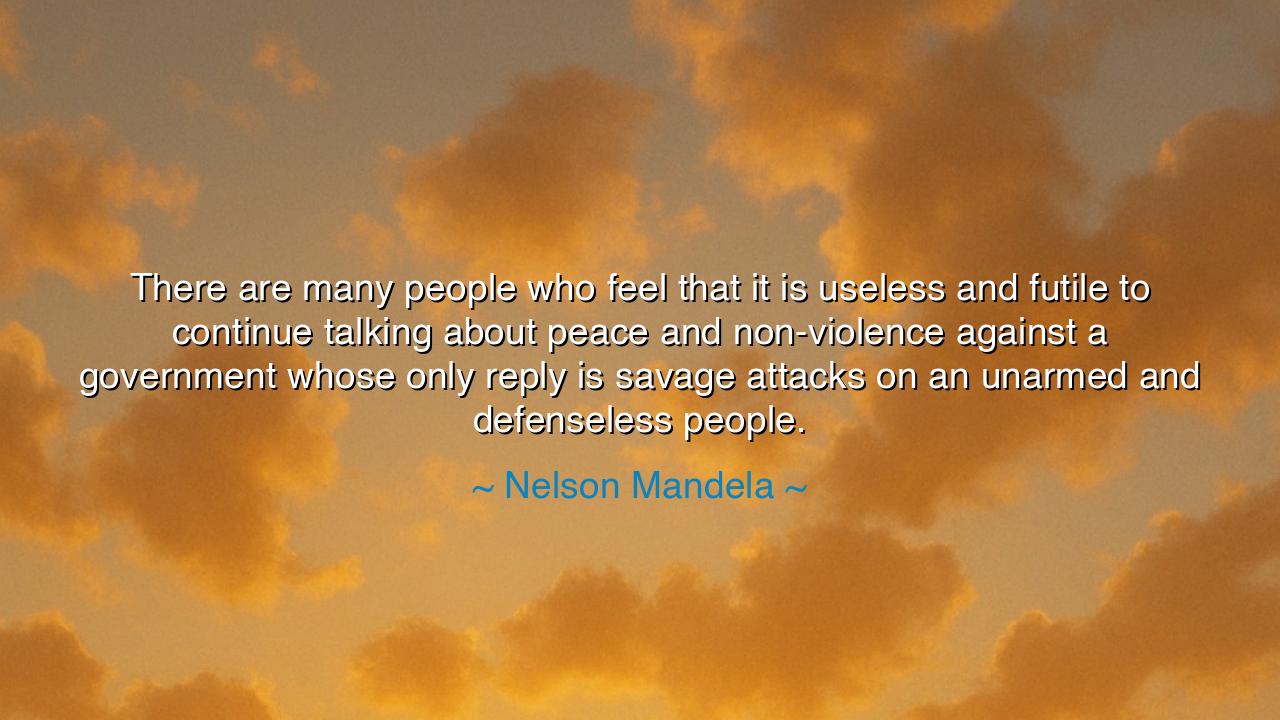
There are many people who feel that it is useless and futile to
There are many people who feel that it is useless and futile to continue talking about peace and non-violence against a government whose only reply is savage attacks on an unarmed and defenseless people.






When Nelson Mandela spoke the words, “There are many people who feel that it is useless and futile to continue talking about peace and non-violence against a government whose only reply is savage attacks on an unarmed and defenseless people,” he was standing at a turning point — not only in his own life but in the moral struggle of an entire nation. These words come from his speech during the early 1960s, when South Africa was suffocating under the brutality of apartheid — a system of racial tyranny where law itself had become a weapon against the innocent. Mandela, once a firm believer in non-violence inspired by Mahatma Gandhi, found himself confronting the terrible truth that reason and restraint could not awaken the conscience of a regime built on oppression. His words, sorrowful yet resolute, capture the moment when patience yields to courage — when the oppressed must choose between dying quietly and standing up to claim their humanity.
The origin of this quote lies in Mandela’s 1961 statement explaining why the African National Congress (ANC), after decades of peaceful resistance, chose to establish its armed wing, Umkhonto we Sizwe, meaning Spear of the Nation. For years, Mandela and his comrades had petitioned, protested, and pleaded for justice, enduring imprisonment, exile, and massacre in return. The Sharpeville Massacre of 1960 — where police opened fire on a crowd of peaceful demonstrators, killing sixty-nine — was the wound that shattered their faith in the effectiveness of peace alone. Mandela did not abandon non-violence lightly; he did so because he realized that non-violence against an enemy who respects no law, no morality, and no mercy becomes not virtue, but surrender. His words were not a call to vengeance, but a cry of necessity — an awakening of a people forced to defend their very right to exist.
In these words, Mandela unveils the tragedy that haunts the history of every oppressed people: that peace without justice is submission, and non-violence without conscience on both sides becomes martyrdom without meaning. His statement reveals a deep moral paradox — the yearning for peace, and the duty to resist when peace becomes impossible. The “savage attacks” he describes are not only acts of physical violence; they are symbols of systemic cruelty — the destruction of homes, the humiliation of families, the silencing of voices. Against such darkness, the call for peace begins to sound hollow unless it is joined by the call for dignity. And thus Mandela, though a man of extraordinary restraint, came to see that true peace is not the absence of conflict, but the presence of justice.
History offers echoes of this same struggle. Consider Mahatma Gandhi in British India, who faced imprisonment, torture, and massacre, yet clung to his belief in the moral power of non-violence. His approach moved empires. But Mandela’s path was forged in a different crucible — one where dialogue had failed utterly. Like the American Revolutionaries before him, who had exhausted every appeal to the British Crown before taking up arms, Mandela understood that resistance, when all peaceful avenues are crushed, becomes not rebellion but duty. He did not glorify violence — he sought only to ensure that the oppressor no longer wielded it unopposed. His courage lay not in the rejection of peace, but in the acceptance of the terrible price that true freedom often demands.
Yet, even as he justified resistance, Mandela never abandoned the ideal of reconciliation. After decades in prison, when he could have chosen vengeance, he instead chose forgiveness. He knew that the struggle for freedom must not end in bitterness, but in rebuilding. This balance — the courage to fight when peace fails, and the humility to forgive when victory comes — is what made Mandela a figure of eternal wisdom. His life teaches that resistance without hatred, and victory without cruelty, are the marks of a truly liberated soul. Violence, for him, was never an end — it was the last resort of a conscience that could no longer bear the chains of injustice.
The lesson of Mandela’s words is thus one of profound moral clarity: peace must be pursued, but never at the cost of dignity. When power mocks the pleas of the powerless, when law becomes a cloak for cruelty, then the duty of every human being is to stand — not in blind rage, but in righteous defiance. The oppressed must never delight in violence, but neither must they bow to it. Each generation must ask itself: are we seeking peace as a shield for cowardice, or as the fruit of justice?
Let this wisdom be passed down as a torch: true peace is born not from submission, but from strength of spirit. When confronted by tyranny, do not surrender your humanity, but defend it with courage and conscience. And when the day of victory comes, let your triumph be tempered by mercy — for the highest freedom is not to defeat one’s enemy, but to free the soul from hatred. Such was the vision of Nelson Mandela — the warrior who fought without cruelty, the prisoner who forgave without bitterness, the leader who taught the world that even in the face of savage injustice, the human heart can remain both resolute and pure.






AAdministratorAdministrator
Welcome, honored guests. Please leave a comment, we will respond soon